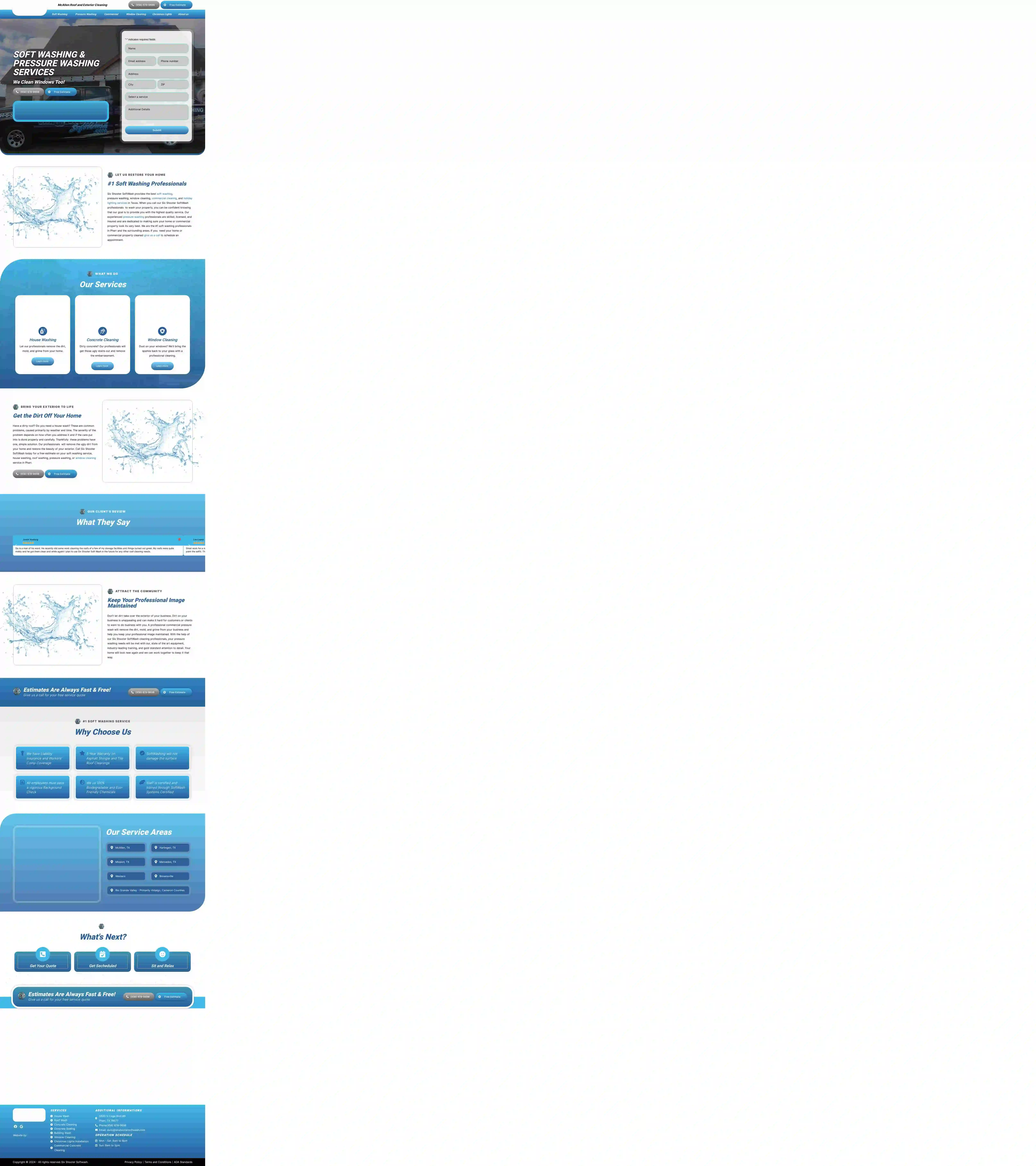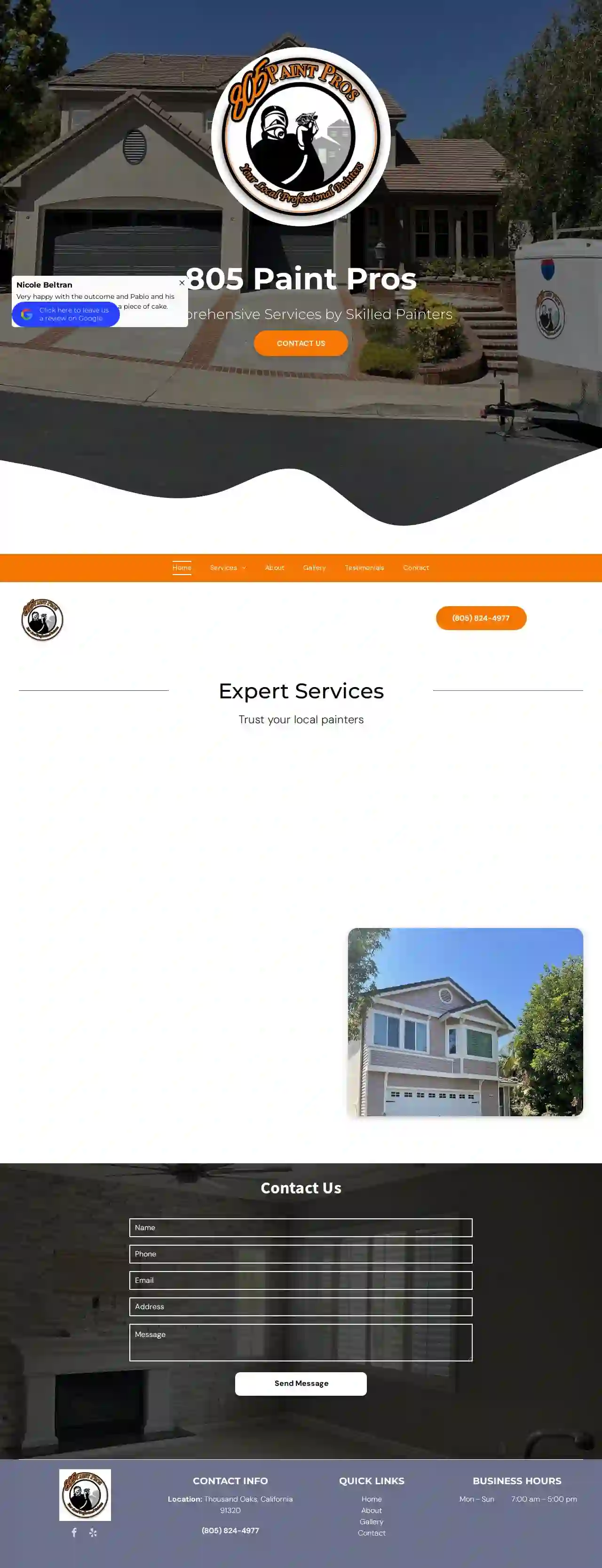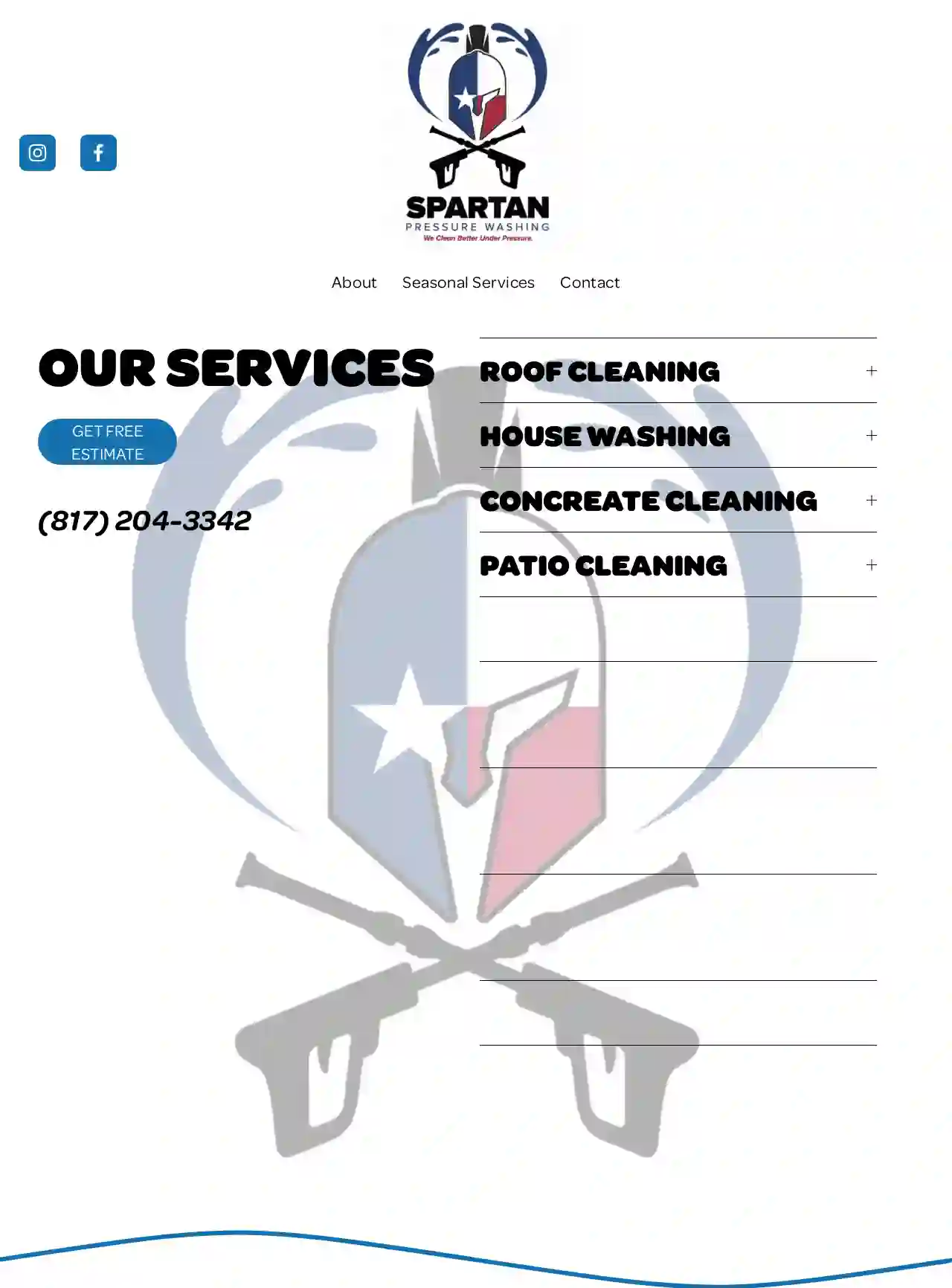Pressure Washing Marlin
Top 10 Deck and Fence Cleaning in Marlin
Get multiple Deck and Fence Cleaning quotes for your project today! Compare profiles, reviews, accreditations, portfolio, etc... and choose the best service.

Lone Star Exterior Pressure Wash and Soft Wash LLC.
517 reviews1415 E. Catherine Cir, Brownsville, 78520, USQUALITY PRESSURE WASHING YOU CAN BE PROUD OF GIVE US A CALL FOR A FREE QUOTE TODAY! Call Us: 956-551-5092 Get My Free Quote Contact Us Fill out my online form. Pressure Washing Professionals! If you are looking for a pressure washing company in Brownsville, Texas, look no further! We are the best pressure washing professionals in the area, and we will do whatever it takes to make sure that your home or business is cleaned like new. We offer a wide range of services in addition to our high-quality roof washing. Some of the services that we offer include gutter cleaning, deck cleaning, building washing, fence washing, sidewalk cleaning, driveway washing, and more! Our mission is simple: to provide our customers with the best customer service possible. We want you to be 100% satisfied with our work so that when you refer us to your friends and family, they, too, will be completely satisfied with our services. We are committed to providing you with all of the information needed so that you can make an informed decision about hiring us as your Brownsville pressure washing provider. If you have any questions or would like more information, please call us or fill out the contact form! Learn More About Us Our Residential Washing Services Are you looking for a pressure washing company in Brownsville that will take your home to the next level? We are the best residential pressure washing services in the area, and we can help you get rid of all of those pesky stains and unsightly spots on your home. Gutter Cleaning House Cleaning Driveway Washing Sidewalk Cleaning Roof Washing Deck Cleaning Fence Washing Window Cleaning Hot & Cold Washing Find Out More Towns We Pressure Wash At Lone Star Exterior Pressure Wash And Soft Wash LLC, we know that a clean home is a foundation for a happy and healthy life. If you live in or around Brownsville, TX, and your home is looking a little rough around the edges, we can help—so give us a call! We are proud to serve the following cities: Brownsville Harlingen McAllen South Padre Island Los Fresnos San Benito Raymondville And More Our Commercial Washing Services We know that a clean, professional facility can be the difference between attracting new customers and losing them. That's why we offer commercial washing services for all your needs. Whether you need to clean a single parking lot or get your entire building looking like new, we can help! Our team is trained in the latest pressure washing techniques and uses
- Services
- Why Us?
- Accreditations
- Our Team
- Testimonials
- Gallery
Get Quote
Six Shooter Softwash
4.98 reviews123 Main St, Pharr, Pharr, TX, USMcAllen Roof and Exterior Cleaning is a professional soft washing, pressure washing, window cleaning, commercial cleaning, and holiday lighting service provider in Texas. Our experienced pressure washing professionals are skilled, licensed, and insured and are dedicated to making sure your home or commercial property look its very best. We are the #1 soft washing professionals in Pharr and the surrounding areas. If you need your home or commercial property cleaned, give us a call to schedule an appointment.
- Services
- Why Us?
- Testimonials
- Gallery
Get Quote
Green Mountain Painting & Contracting
4.870 reviews530 Ruby Drive, Fort Collins, CO, 80525, USGREEN MOUNTAIN & CONTRACTING is Colorado's Top-Rated Commercial & Residential Painting Contractor and Professional Christmas Light Installation Company. We are on a mission to change our industry's standards of Quality & Customer Service. Voted Fort Collins Best Painting Company 4 years in a row! We are dedicated to maximizing the value of your property through our team's commitment to quality workmanship, unparalleled attention to detail, and a commitment to customer service. We offer a 100% Satisfaction Guarantee and use premium paints on every project. We also offer a free two-year warranty and financing options available for all projects and all credit scores. Our team cares about your satisfaction and we are proud to serve Northern Colorado and the Front Range.
- Services
- Why Us?
- Accreditations
- Our Team
- Gallery
Get Quote
Foothills Deck Refinishing
55 reviewsFort Collins, CO, 80521, USServing Northern Colorado for over 30 years, "Clean World Services" NOW, Foothills Deck & Fence Refinishing, are outdoor wood refinishing specialists. We recommend BOODGE natural wood products. Find out more. Proper surface preparation is the key to successful refinishing. Staining, Painting, Stripping, Sanding services. Call for a Free estimate Today :-)
- Services
- Why Us?
- Gallery
Get Quote
Original Softwash | Roof & Exterior Cleaning
5110 reviews123 Main St, Suite 101, Brooksville, 34604, USOriginal Softwash is a full-service pressure washing company specializing in soft washing, a gentle yet effective way to clean your home or business without damaging the surface. We offer a variety of exterior pressure washing services to ensure your entire property is immaculately clean. Our team is highly trained, and we use state-of-the-art equipment to ensure your satisfaction.
- Services
- Why Us?
- Accreditations
- Our Team
- Testimonials
- Gallery
Get Quote
EZ Pressure Washing
54 reviewsSpringfield, MO, 123 Main St, 65804, USWelcome to EZ Window Washing, your go-to team for pristine and spotless windows in Springfield, MO and Tulsa, OK. With our high-quality cleaning services, we guarantee to transform your dull and dirty windows into sparkling panes that let in the natural light. Our team utilizes the latest equipment and eco-friendly cleaning solutions to ensure a streak-free and long-lasting shine. Whether you need residential or commercial window cleaning, solar panel cleaning, dryer vent cleaning, or any of our other services, we are committed to delivering exceptional results tailored to your specific needs. Give us a call today for a free estimate.
- Services
- Why Us?
- Accreditations
- Our Team
- Testimonials
- Gallery
Get Quote
Conejo Power Wash
4.19 reviewsThousand Oaks, CA, 91360, USConejo Power Wash is your locally owned and operated pressure washing solution serving the Conejo Valley and surrounding areas. We take pride in providing high-quality, eco-friendly pressure washing services for both residential and commercial properties. Our team of well-trained professionals is dedicated to exceeding your expectations and ensuring your complete satisfaction. We offer a wide range of services, including hot and cold water pressure washing, window cleaning, and sealing for brick, stone, and concrete. We are fully insured, including 2 million dollars in general liability insurance, to protect your property. We are committed to using environmentally friendly cleaning products to safeguard your home, business, garden, and pets. Check out our positive reviews on Yelp, Google, and Nextdoor, and our A+ rating with the Better Business Bureau. We serve Thousand Oaks, Westlake Village, Santa Rosa Valley, Newbury Park, Camarillo, Santa Barbara, Oak Park, Agoura Hills, Simi Valley, Moorpark, Ventura, Malibu, and West Los Angeles.
- Services
- Why Us?
- Accreditations
- Our Team
- Gallery
Get Quote
Pressure Washing In Stafford
513 reviews735 Dulles Avenue APT 112, Stafford, 77477, USWelcome to Pressure Washing In Stafford, where we take pride in our great customer service and high quality pressure washing services. With over 10 years of experience serving our community and a reputation of providing the best pressure washing services in the Stafford and surrounding areas, we hope to become your #1 choice for pressure washing services in Stafford and all of the surrounding communities. We are the number one pressure washing company in Stafford, TX. We’ve been in the industry for over 10 years. We offer quality pressure washing services at an affordable price. You won’t find better quality pressure washing services anywhere. We will go above and beyond to meet all your pressure washing needs. We are experts in residential pressure washing, commercial pressure washing, and concrete cleaning. We are dedicated to making your property shine like it was new! When it comes to pressure washing, our main objective is to keep your home, business, or property looking great. It doesn’t matter if you’re in need of residential pressure washing, commercial pressure washing, or concrete cleaning, we’ve got you covered. We know that your home is important, and we want to help you with all of your cleaning needs. No job is too small or too big for our team of experienced pressure washing experts! We take care of all types of jobs and have the equipment necessary to get the job done right. We offer many services, and our pricing is affordable.
- Services
- Why Us?
- Testimonials
- Gallery
Get Quote
805 Paint Pros
4.9157 reviewsNA, Thousand Oaks, 91320, US805 Paint Pros is here to help with your painting needs! Locally owned and operated in Thousand Oaks, CA, we offer professional residential and commercial painting services. Our knowledgeable paint contractors welcome painting projects of all shapes and sizes! We have a proven track record of delivering outstanding service from consultation to completion.All of our painting services, from drywall repair to cabinet painting, are budget-conscious and affordably priced. As a responsible, reliable painting service provider, we are fully licensed and insured for your peace of mind.805 Paint Pros was founded in 2018 in Thousand Oaks, CA, and has over 12 years of industry experience. Expect detail-oriented workmanship performed with punctual service times and prompt, responsive customer care when you team with us for your painting project. As an honest painting company, we operate with integrity and ethical business principles. There are no hidden fees and we are always flexible with your preferences and schedule - we cater to the needs of our customers. As your friendly neighborhood painting pros, our top priority is the satisfaction of our customers. Bilingual services are available for your convenience and we gladly offer free estimates. Let us know how we can best serve your painting needs by calling us now!
- Services
- Why Us?
- Accreditations
- Our Team
- Testimonials
- Gallery
Get Quote
Spartan Pressure Washing LLC
53 reviewsFort Worth, USSpartan Pressure Washing is a locally owned and family operated business based out of Fort Worth, Texas. Our mission is to ensure our customers are 100% satisfied with the services we provide. We are proud to offer a full line of services to the North Texas area. When you need the job done right the first time, call Spartan Pressure Washing.
- Services
- Why Us?
- Gallery
Get Quote
Over 60,241+ Cleaning Businesses on our platform
Our cleaning service providers operate in Marlin & surrounding areas!
CleaningMatch has curated and vetted the Best Cleaning Businesses arround Marlin. Find a reliable pro today.
Frequently Asked Questions About Pressure Washing
- Size of the Area: Larger areas generally cost more to pressure wash than smaller ones.
- Type of Surface: Different surfaces require different pressure levels and cleaning solutions, which can affect pricing.
- Condition of the Surface: Heavily soiled or stained surfaces may require more time and effort to clean, impacting cost.
- Accessibility: Difficult-to-reach areas may require specialized equipment and increase costs.
- Additional Services: Services like pre-treating stains, applying protective coatings, or mold removal may incur additional charges.
- Experience and Expertise: Professionals have the knowledge and skills to choose the right pressure levels and cleaning solutions for different surfaces, minimizing the risk of damage.
- Professional Equipment: Pressure washing companies use commercial-grade equipment that is more powerful and efficient than consumer-grade pressure washers.
- Safety: Pressure washing can be hazardous, especially when working on ladders or with high-pressure water. Professionals are trained in safety procedures and have the necessary equipment to work safely.
- Time-Saving: Pressure washing can be time-consuming, especially for larger projects. Hiring professionals frees up your time for other tasks.
- Cover or Shield Plants: Before pressure washing, cover or shield delicate plants and landscaping with tarps, plastic sheeting, or painter's tape to protect them from water spray and chemicals.
- Use Lower Pressure Settings: If pressure washing near plants, use lower pressure settings and avoid directing the spray directly at them.
- Rinse Plants with Water: After pressure washing, rinse plants thoroughly with plain water to dilute any chemicals that may have landed on them.
- Choose Plant-Safe Cleaning Solutions: If using cleaning solutions, opt for environmentally friendly or plant-safe options whenever possible.
- Annually: Pressure washing your house at least once a year helps remove accumulated dirt, grime, and other contaminants, keeping it looking its best.
- Every 2-3 Years: If you live in an area with high humidity, heavy tree cover, or frequent exposure to pollutants, more frequent pressure washing may be necessary.
- When Visible Dirt and Grime Appear: Address visible dirt, stains, or mold growth promptly to prevent them from becoming more challenging to remove.
How much does pressure washing cost?
To get accurate pricing, request quotes from multiple pressure washing companies. Provide details about the size and type of surface, its condition, and any additional services you require.
Can I pressure wash my own house?
If you're considering DIY pressure washing, assess the complexity of the project, your experience, and the risks involved. For larger or more challenging projects, hiring professionals is often a wiser and safer choice.
Can pressure washing damage my plants?
Taking these precautions minimizes the risk of damage to your plants and landscaping during pressure washing.
How often should I pressure wash my house?
Regular pressure washing can maintain your home's exterior, extend the lifespan of your siding, and enhance its curb appeal.
How much does pressure washing cost?
- Size of the Area: Larger areas generally cost more to pressure wash than smaller ones.
- Type of Surface: Different surfaces require different pressure levels and cleaning solutions, which can affect pricing.
- Condition of the Surface: Heavily soiled or stained surfaces may require more time and effort to clean, impacting cost.
- Accessibility: Difficult-to-reach areas may require specialized equipment and increase costs.
- Additional Services: Services like pre-treating stains, applying protective coatings, or mold removal may incur additional charges.
To get accurate pricing, request quotes from multiple pressure washing companies. Provide details about the size and type of surface, its condition, and any additional services you require.
Can I pressure wash my own house?
- Experience and Expertise: Professionals have the knowledge and skills to choose the right pressure levels and cleaning solutions for different surfaces, minimizing the risk of damage.
- Professional Equipment: Pressure washing companies use commercial-grade equipment that is more powerful and efficient than consumer-grade pressure washers.
- Safety: Pressure washing can be hazardous, especially when working on ladders or with high-pressure water. Professionals are trained in safety procedures and have the necessary equipment to work safely.
- Time-Saving: Pressure washing can be time-consuming, especially for larger projects. Hiring professionals frees up your time for other tasks.
If you're considering DIY pressure washing, assess the complexity of the project, your experience, and the risks involved. For larger or more challenging projects, hiring professionals is often a wiser and safer choice.
Can pressure washing damage my plants?
- Cover or Shield Plants: Before pressure washing, cover or shield delicate plants and landscaping with tarps, plastic sheeting, or painter's tape to protect them from water spray and chemicals.
- Use Lower Pressure Settings: If pressure washing near plants, use lower pressure settings and avoid directing the spray directly at them.
- Rinse Plants with Water: After pressure washing, rinse plants thoroughly with plain water to dilute any chemicals that may have landed on them.
- Choose Plant-Safe Cleaning Solutions: If using cleaning solutions, opt for environmentally friendly or plant-safe options whenever possible.
Taking these precautions minimizes the risk of damage to your plants and landscaping during pressure washing.
How often should I pressure wash my house?
- Annually: Pressure washing your house at least once a year helps remove accumulated dirt, grime, and other contaminants, keeping it looking its best.
- Every 2-3 Years: If you live in an area with high humidity, heavy tree cover, or frequent exposure to pollutants, more frequent pressure washing may be necessary.
- When Visible Dirt and Grime Appear: Address visible dirt, stains, or mold growth promptly to prevent them from becoming more challenging to remove.
Regular pressure washing can maintain your home's exterior, extend the lifespan of your siding, and enhance its curb appeal.